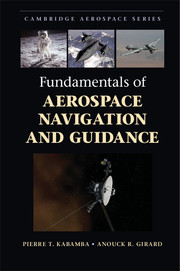Book contents
- Frontmatter
- Dedication
- Contents
- Preface
- 1 Introduction
- 2 Deterministic Systems Theory
- 3 Stochastic Systems Theory
- 4 Navigation
- 5 Homing Guidance
- 6 Ballistic Guidance
- 7 Midcourse Guidance
- 8 Optimization
- 9 Optimal Guidance
- 10 Introduction to Differential Games
- Epilogue
- APPENDIX A Useful Definitions and Mathematical Results
- Bibliography
- Index
4 - Navigation
Published online by Cambridge University Press: 05 October 2014
- Frontmatter
- Dedication
- Contents
- Preface
- 1 Introduction
- 2 Deterministic Systems Theory
- 3 Stochastic Systems Theory
- 4 Navigation
- 5 Homing Guidance
- 6 Ballistic Guidance
- 7 Midcourse Guidance
- 8 Optimization
- 9 Optimal Guidance
- 10 Introduction to Differential Games
- Epilogue
- APPENDIX A Useful Definitions and Mathematical Results
- Bibliography
- Index
Summary
In this chapter, we present the theory that is used in the analysis and design of navigation systems for aerospace vehicles, with an emphasis on the fundamentals rather than on their hardware implementation. The purpose of navigation is twofold: to estimate the position and velocity of a vehicle based on the output of imperfect sensors and to assess the accuracy of these estimates. Mathematically, this corresponds to computing the first and second moments (expected value and covariance) of a particular random variable. Note that one should not neglect the importance of the accuracy assessment. Indeed, for a vehicle traveling in the vicinity of Earth, the question “Where is the vehicle?” can always be answered by “On the Sun, to within one light-hour.” (Recall that the Earth is 8 light-minutes away from the Sun.) Such an answer, although it is correct, is totally useless for guiding the vehicle in the vicinity of the Earth. It is therefore very important to quantify the navigation error.
We start, in Section 4.1, by considering the navigation problem under the most restrictive assumptions: perfect sensors, nonredundant measurements, static estimation, nonrecursive processing, and perfect clock. Then, in subsequent sections, we remove these assumptions sequentially to build up the theory. Specifically, Section 4.2 considers position fixing with imperfect, nonredundant measurements, and Section 4.3 treats the case of imperfect redundant measurements.
- Type
- Chapter
- Information
- Fundamentals of Aerospace Navigation and Guidance , pp. 78 - 117Publisher: Cambridge University PressPrint publication year: 2014

